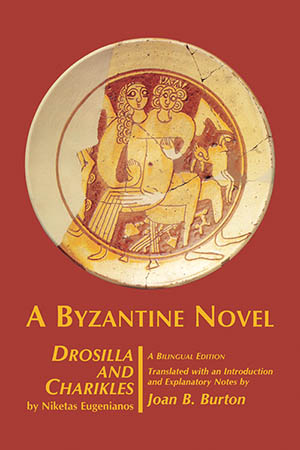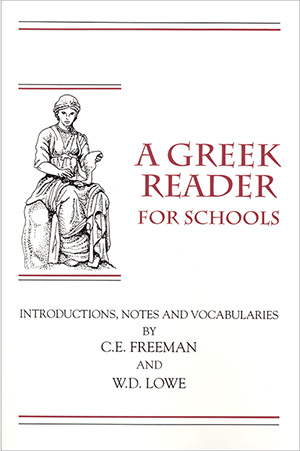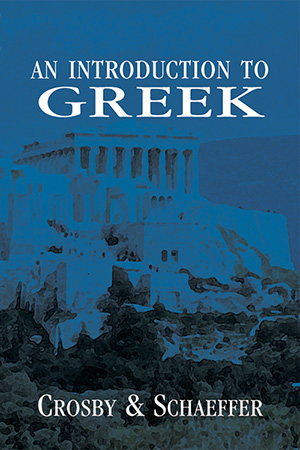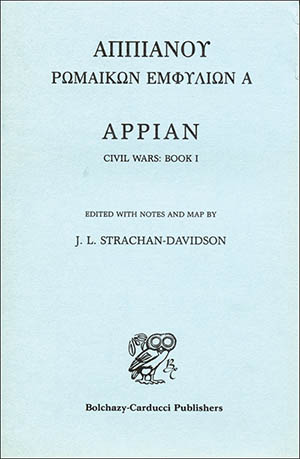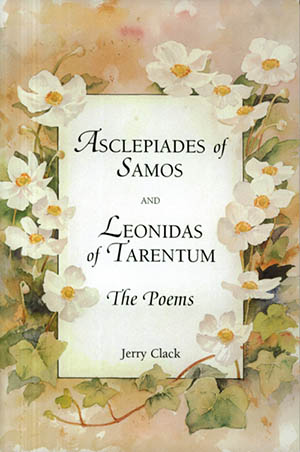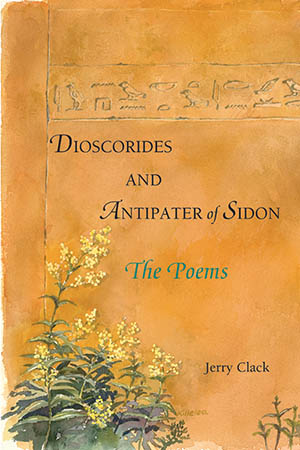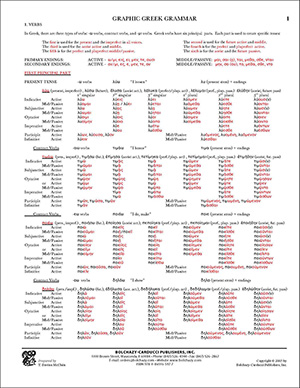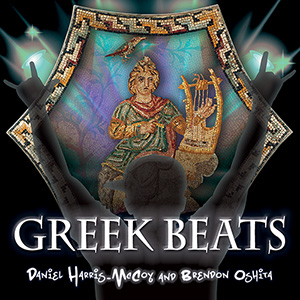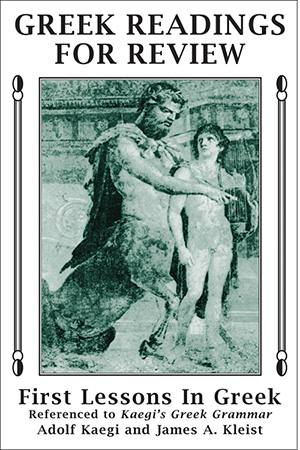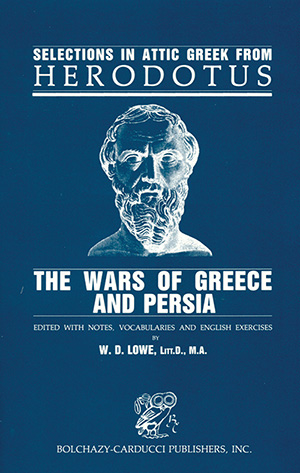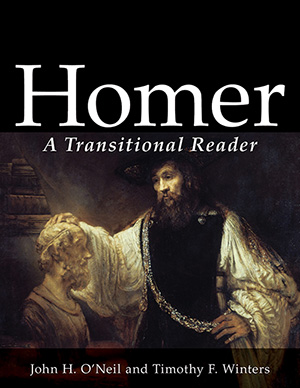A Byzantine Novel: Drosilla and Charikles, by Niketas Eugenianos
- Translator: Joan Burton
- 536X
- 978-0-86516-536-6
- Paperback
- 207
Niketas Eugenianos's Drosilla and Charikles is one of four existing Byzantine (12th-century) Greek novels. These novels represent the rebirth of the ancient novel after a hiatus of eight centuries in the deeply Christian world of Constantinople. Written under the Komnenian dynasty and during the time of the crusades these novels revived the pagan Greek world with its pagan gods and beliefs, and also reflected the customs and beliefs of their own time.
A Greek Reader for Schools
- 2670
- 978-0-86516-267-9
- Paperback
- 146
Reprinted by arrangement with Oxford University Press, this reader is a perfect vehicle for students transitioning from a grammar text to reading adapted Greek. The selections are chosen for their accessibility and facility to encourage a quick reading. Excerpts from Aesop to Plato strengthen reading and translations skills while introducing the intermediate student to key works from the classical Greek canon.
An Introduction to Greek
- 5548
- 978-0-86516-554-0
- Paperback
- 440
This standard textbook introduces students to ancient Greek in an organized, systematic way. Review lessons are included at logical intervals and the last six of 79 chapters are reviews of participles, infinitives, subjunctives, optatives, imperatives, and indicatives.
Appian Civil Wars: Book 1
- Author: J.L. Strachan-Davidson
- 021X
- 978-0-86516-021-7
- Paperback
- Bolchazy-Carducci Publishers, Inc.
- 164
Asclepiades of Samos and Leonidas of Tarentum : The Poems
- Author: Jerry Clack
- 4568
- 978-0-86516-456-7
- 280
Asclepiades of Samos and Leonidas of Tarentum set the course that later Greek epigrammatists would follow in their choice of subject matter. To Asclepiades, the epigram was a vehicle for personal feeling; in the hands of Leonidas the field was broader, dwelling often on the suffering that attends the poor and destitute.
Dioscorides and Antipater of Sidon : The Poems
- Author: Jerry Clack
- 5114
- 978-0-86516-511-3
- Paperback
- 224
Of all the Greek epigrammatists, Dioscorides and Antipater of Sidon perhaps most faithfully represent the Hellenistic society's reaction to a rapidly changing world — its introverted individualism. Their epigrams, distinguished by conciseness and range of themes, express the ephemeral nature of happiness and the inevitability of death. These epigrams — with their brief scope, intriguing subject matter, rhetorical flourishes, and intricately embroidered thematic variation — offer an enjoyable and attainable introduction to Hellenistic epigram.
Graphic Greek Grammar Cards
- Author: T. Davina McClain
- 5971
- 978-0-86516-597-7
- Flash Cards
- 12
Graphic Greek Grammar is a set of reference cards that present, in easy-to-read format, the morphological and syntactical information students need in their study of Ancient Greek. The goal throughout is clarity and simplicity.
Greek Beats Complete Collection
- By author: Daniel Harris-McCoyBy composer: Brendon Oshita
- GBComp
Bolchazy-Carducci Publishers download service is under maintenance, download products are unavailable for purchase until July 1st.
Engage your student in learning Greek grammar through aural, oral, visual, and kinetic learning. Grammar set to catchy electronic music makes Greek, like a favorite song, stick in the student's head. Listen to the tracks, read along on the lyrics sheet, sing the lyrics yourself with the karaoke tracks, and, if the music moves you, dance to the beat of declensions and conjugations! Available as individual tracks or download all twenty-one at a reduced price. The "karaoke" version, available for purchase separately, contains the music from all twenty-one tracks without the lyrics. Make sure to create an account before purchasing to be able to access downloads for multiple devices.
Greek Beats Karaoke Collection
- GBKara
Bolchazy-Carducci Publishers download service is under maintenance, download products are unavailable for purchase until July 1st.
Engage your student in learning Greek grammar through aural, oral, visual, and kinetic learning. Grammar set to catchy electronic music makes Greek, like a favorite song, stick in the student's head.
Greek Readings for Review: First Lessons in Greek
- Author: Adolf Kaegi
- 5491
- 978-0-86516-549-6
- Bolchazy-Carducci Publishers Inc.
- 153
Designed as a complement to the popular Kaegi's Greek Grammar, this volume is aimed at building fluidity and ease of translation through readings, exercises, guided review of grammar, and memorization of vocabulary. The reading lessons are keyed to review from Kaegi's Greek Grammar, and progress from what are essentially drills of single words in the first pages to single sentences of increasing complexity. The lessons are supplemented halfway through by optional, connected-paragraph readings. English-to-Greek translation exercises are included after each reading lesson. A selection of more advanced readings from Ancient Greek authors rounds out the text. All readings have vocabulary, grammar, translation, and background help in footnotes, as well as a vocabulary of words frequently met in ancient Greek authors (and meant to be memorized), arranged in the back according to the individual lessons. Also included are a brief, helpful section, "Some Rules of Syntax," and two indices: a "List of Greek Words" and "List of English Words."
Herodotus: The Wars of Greece and Persia
- Author: W.D. Lowe
- 0546
- 978-0-86516-054-5
- Paperback
- Bolchazy-Carducci Publishers, Inc.
- 144
Homer: A Transitional Reader
- 7206
- 978-0-86516-720-9
- Paperback
- Bolchazy-Carducci Publishers
- 142
This reader eases students into reading continuous, original Homeric Greek. Fifteen passages from the Iliad are included with pre-reading materials, grammatical and comprehension exercises, vocabulary and grammar notes, and more.

